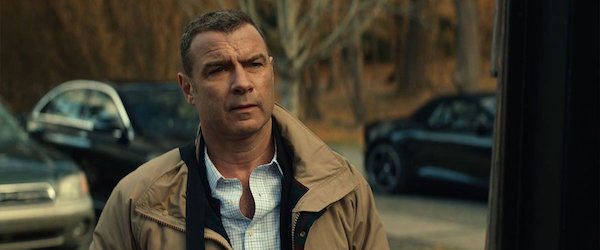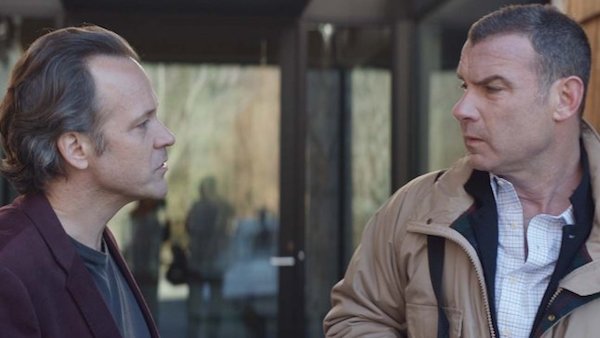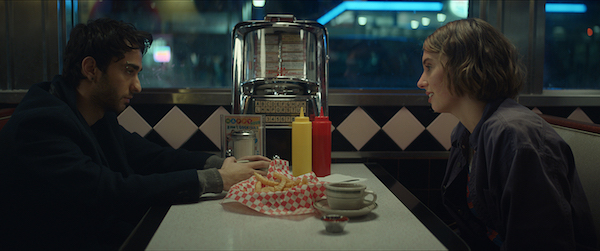
Bicycling home from work at a fundraising dinner, a waiter (Dominic Colón) is struck by a car on a dark stretch of road. That’s the springboard for an ambitious drama from Marc Meyers, director of This Is Dahmer. Based on a novel by Stephen Amidon and the 2013 Italian film Il Capital Unman by Paolo Virzi, Human Capital screened in Toronto and Tribeca in 2019. Another COVID-19 casualty, it is now streaming on DIRECTV.
Oren Moverman’s script moves back and forth in time, expanding from the hit-and-run to examine three families on a diverse economic and social spectrum. As the families intersect, Moverman can repeat encounters and scenes from different angles.
The framework gives the filmmakers the freedom to cover a lot of territory. Like realtor Drew Hegel (Liev Schreiber), on his second marriage and struggling with debt. He uses his teen daughter Shannon (Maya Hawke) to finagle a meeting with hedge fund mogul Quint Manning (Peter Sarsgaard), setting in motion a financial deal that’s way out of his league.

One bad choice leads to another, as Drew fakes his income on a financial filing, then takes out a loan he can’t repay. He also can’t communicate with Shannon, who disappears with her friend Jamie Manning (Fred Hechinger), and is hard-pressed to deal with his wife Ronnie (Betty Gabriel), a therapist who announces that she’s pregnant.
No one in Human Capital can talk honestly, least of all Carrie Manning (Marisa Tomei), Quint’s wife. A former actress in low-budget horror films, she now fills her days shopping aimlessly, crying in the back seat of her limo, and trying to find meaning by turning a derelict movie theater into an arts center.
That effort leads to a betrayal by her husband and his lawyer (Aasif Mandvi), as well as a furtive affair with a college professor. As well as conflict with Jamie, who’s realized that he’s gay.

Shannon has her own problems, including lingering resentment of her estranged mother, discovering that her boyfriend doesn’t like girls, and an encounter with Ian Warfield (Alex Wolff), one of Ronnie’s patients. Turns out Ian’s done time for drugs in a reform school, and has been ordered to see Ronnie for what he calls violent fantasies.
Young and old, rich and poor, crooked and honest—Overman sketches out the story out patterns that ultimately feel too rigid. And despite his clear intent to treats the characters in a realistic, sympathetic way, Human Capital falls into the same do-gooder traps as movies like Crash and Grand Canyon.
Similarly, Meyers’ direction feels heavy-handed. Pointing out foibles and lingering over frailties makes it seem as if the filmmakers were superior to the characters. While individual scenes can ring true, Meyers fails to present a convincing overall approach to the material. Too often Human Capital seems glum and inert.
But an exceptionally rich cast makes just about every role interesting. Tomei is undone by her dialogue; still, she adds more nuance to Carrie than you would expect. Sarsgaard’s smarmy conceit as Quint is first-rate. Schreiber captures his character’s neediness. This is someone who’s learned from life that what might go wrong will. Watch his response when his wife wants to talk to him: “What did I do?” he asks plaintively, automatically assuming he’s at fault.
The real surprise in Human Capital is Maya Hawke, who’s coming off an attention-grabbing part in Once Upon a Time…in Hollywood and a recurring role in Stranger Things. It takes time for the movie to focus on Shannon’s story; when it does, everything starts to click. Hawke’s scenes with Alex Wolff are light and breezy at first, then slide into deeply emotional moments that feel honest and true. And as fate closes in on Ian, all the plot machinations and narrative tricks start to make sense.
A mixed bag at best, Human Capital deserves credit for trying to deal with issues that affect its target viewers. The talented cast and carefully modulated cinematography by Kat Westergaard are not inconsiderable bonuses. But Maya Hawke’s work with Alex Wolf is what really makes this worth watching.
One final note: Mark Blum, who has a small role, died on March 26 from the effects of coronavirus.


